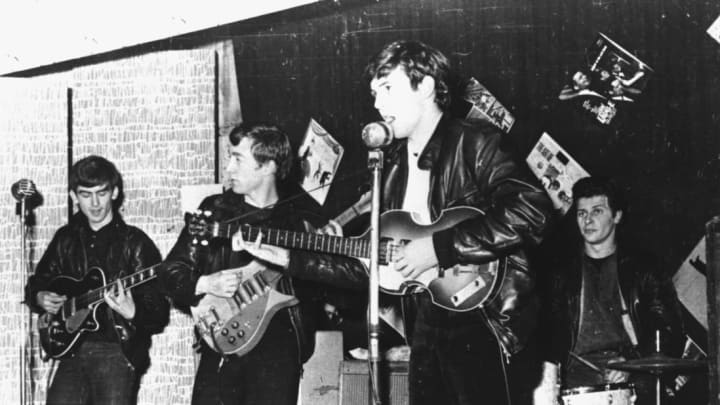Pete Best was never told why he was fired from the Beatles.
Of course, that hasn’t stopped fans and the media alike from piecing together theories ranging from Best outshining the rest of the band to Ringo Starr simply being a superior drummer. In the 50-odd years since Best was removed on August 16, 1962, he’s shared pieces of the puzzle, captivating a niche group of Beatlemaniacs who can’t help but wonder how things might have been if Best had remained behind the drumset.
The formation of the Beatles—originally known as the Quarrymen—is tightly linked to the coffee shop owned by Best’s mother, Mona. According to AARP, "Mo" was inspired by a report she saw on TV about a coffee house that attracted musical talent, and she decided to open her own shop in the family’s basement.
“She opened up the Casbah Coffee Club the 29th of August, 1959, and the funny thing was the band which opened it, the Quarrymen, went on to become the Beatles,” Best told AARP. Not only were the Quarrymen the first act to perform there, but Paul McCartney, John Lennon and George Harrison all helped to paint the walls to get the cellar ready for opening night.
At the time, Best was playing with his own band, the Blackjacks, but in 1960 he was recruited by the Beatles—who were going by the “Silver Beatles” at the time—as their drummer. During his two years in the band, Best auditioned for Decca Records with the Beatles and recorded what would become the band’s breakout hit, “Love Me Do.” (The band recorded a new version with Ringo before releasing it as a single in October 1962.) But in August 1962, the morning after another well-received gig at the famous Cavern Club, manager Brian Epstein called Pete into his office and gave him the bad news.
“I walked into Brian’s office … and he was quite agitated, fidgety,” Best explained in the 2006 documentary Pete Best of the Beatles: The Greatest Rock ‘n’ Roll Story Never Told. "‘Pete,’ he said. ‘I really don’t know how to tell you this, but I will.’ And he said, ‘In short, the boys want you out and it’s already been arranged that Ringo [Starr] will join the band on Saturday.’ And that was the bombshell. I couldn’t believe what was happening. Am I in a dream? Am I in a nightmare? I want to wake up, someone pinch me.” Best, who was just 20 years old at the time, went home and cried.
Astrid Stawiarz // Getty
As Best tells it, the story for the public was spun to imply that he willingly and amicably left the band. “And that didn’t sit right with fans,” he added. “You know they basically turned around and said, 'You wouldn’t leave a band. Why would you leave that band?'"
Best told AARP that he thinks the only person still alive who knows the reason behind him getting fired is Paul McCartney, although the two have never discussed it. In fact, Best told David Letterman in 1982 that once he left Epstein's office, he never spoke to John, Paul or George ever again. Best’s official website reports that following his dismissal from the band, he was approached by two other groups—including Rory Storm & The Hurricanes, which Starr vacated to join the Beatles—but he joined Lee Curtis and The All Stars, who became a rival of the Beatles. Best's new band even opened for the Beatles twice, and yet there was no acknowledgement by his former bandmates that he was there. "Stony silence," as Best recalled.
“There were things to be said, but that wasn't the place to hear your differences, onstage, so there was no communication," Best told Spinner in 2009. "We'd pass like ships in the night. Some people say, 'Well, why the hell didn't you just pick up the phone?' and I've always said, 'Well, have you ever tried to phone a Beatle? It just doesn't happen.' You couldn't get to them."
Best, who went on to front his own quartet when his new band eventually split from Lee Curtis and renamed themselves the Pete Best Four, now approaches his experience with the Beatles with gratitude.
“Some people expect me to be bitter and twisted, but I'm not,” Best told the Daily Mail in 2007. “I feel very fortunate in my life. God knows what strains and stresses the Beatles must have been under. They became a public commodity. And John paid for that with his life.”
